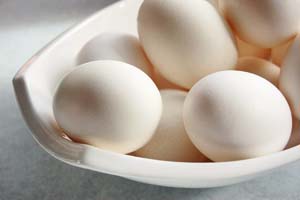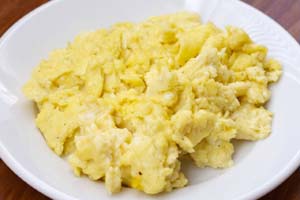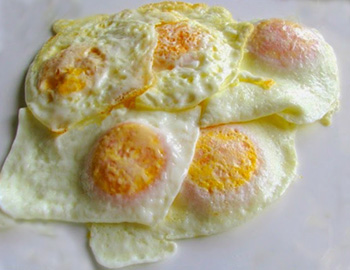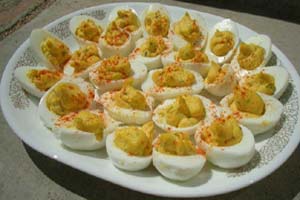


Ramblynn's Recipes - EGGS
Hard Boiled Eggs | Scrambled Eggs | Fried Eggs | Deviled Eggs |
Hard Boiled Eggs
Eggs are one of nature’s most versatile foods. They’re packed with protein, vitamins,
and omega-3 fatty acids. Unfortunately, people shy away from boiling eggs because — let’s
face it — peeling them can be such a pain. With our 4 tricks, shells will slip right off.
TIP: Keep eggs in the refrigerator for a week before boiling. If you can’t wait a week, you
can mimic the aging effect by alkalizing your water. To do this, add a heaping teaspoonful of
baking soda to the water as you boil your eggs and the shells will be easier to peel.
Use Baking Soda to Simulate Aging
Most of the time, cooks want the freshest eggs possible. Boiled eggs are an exception to
this rule. As eggs age they become more alkaline, which makes the white pull away from the shell,
creating an air pocket that makes them easier to peel.
Tip: A cold egg dropped into boiling water has a high likelihood of cracking. Rather than boiling water and
then dropping your eggs in, put them in the pot pre-boil. Or, try allowing the eggs to come to
room temperature for one hour before placing into boiling water to help with cracking.
Be Mindful of Temperature
We have all experienced the frustration of eggs cracking and whites seeping out into boiling water.
This is preventable. Extreme temperature change is what causes cracking.
TIP: Transfer your boiled eggs to a bowl of ice water while they’re still hot. Then, peel
still-warm eggs under cold running water.
Add a Touch of Vinegar
The vinegar works in two ways: It causes any egg white that would escape through cracks to quickly
coagulate, keeping it close to the shell, and it slightly breaks down the shell making it easier to peel.
TIP: Transfer your boiled eggs to a bowl of ice water while they’re still hot. Then, peel
still-warm eggs under cold running water.
Peel Under Cold Water
The cold water will cause the cooked egg to contract and pull away from the shell, making it easier
to peel. The water will help gently nudge the shell away.

Ingredients
- 6 large eggs
- 1 Teaspoon baking soda
Fill a medium pot with water and baking soda and gently lower the eggs into the pot. Bring to a
simmer over medium high heat. Start timing once the water begins to simmer. Simmer eggs for 3
minutes for soft-boiled, 5 minutes for medium-boiled, and 8 to 12 minutes for hard-boiled. Remove from
heat and carefully transfer the eggs to a bowl filled with ice water. When eggs have cooled
enough to handle, crack on the counter and peel under cold running water.
TIP: Use peeled eggs right away and always keep boiled eggs cold, as they spoil quickly.
Unpeeled, boiled eggs can be kept in the refrigerator for up to one week.
Scrambled Eggs

Ingredients
- 6 large eggs
- 6 teaspoons low-fat milk (1 teaspoon for each egg)
- 1 tablespoon butter (can be olive oil)
- 1/4 teaspoon salt (or add to taste)
- 1/8 teaspoon pepper (or add to taste)
Overcooking is a common problem with scrambled eggs. The perfect scrambled eggs should be soft and
just a little bit moist.
In large metal or glass mixing bowl, whisk the eggs with the milk and salt. Beat vigorously for 2 minutes.
Well-beaten eggs are "frothy and evenly colored". When your eggs match that description you should stop beating.
Alternatively, you can place the eggs, milk and salt in a blender and blend for 20 to 25 seconds.
Allow the mixture to set for a couple minutes to let the foam settle.
Heat a large non-stick frying pan to a setting just above medium. A 12-inch pan works well for 6 eggs.
Do not add the butter yet, let the pan warm up. Melt the butter in the frying pan. As the very last of
the butter is liquefying, add the egg mixture.
Do not stir. Wait until the first hint of setting begins. Using a spatula or a flat wooden spoon,
push eggs toward center while tilting skillet to distribute runny parts. Continue this motion
as the eggs continue to set. Break apart large pieces as they form with your spoon or spatula. You will
come to a point where the push-to-center technique is no longer cooking runny parts of the egg. Flip over
all the eggs. Allow the eggs to cook 15 to 25 seconds longer.
TIP: Spice up your eggs with bacon, mushrooms, ham, cheese or anything else you choose.
Fried Eggs
There isn’t the right kind of fried egg, no correct way to cook it, no guidebook or recipe or even a textbook. There’s just an egg, a bit of fat, some heat. Heat matters. If heat is too high, eggs will become tough and rubbery. Gentle heat preserves nutrients and allows for even cooking. Fresh eggs produce the perfect, best-looking fried-eggs. To avoid the possibility of a piece of shell getting into the pan when cooking multiple eggs, you should crack your eggs into a small bowl to check for shells before putting it in the pan.

Ingredients
- as many eggs as you want
- butter or canola oil to suit
- salt and pepper to taste
Over easy or hard
Heat butter (canola oil) in nonstick skillet or iron pan over medium-high heat until hot.
Break eggs and put into pan, 1 at a time. Immediatley reduce heat to low.
Cook slowly until whites are completely set and yolks begin to thicken but are not hard, 5 to 6 minutes.
Use a spatchula under each egg and carefully turn it over in the pan (if you are using a French Skillet
flip your eggs). Cook second side until done. Salt and pepper to taste.
Eat as is or put it on a piece of toast, over some hashbrowns or anything else you choose. Yummy!
Sunny Side or Basted Eggs
Heat butter (canola oil) in nonstick skillet, use twice as much butter than for over easy eggsd.
Cook until edges turn white. Begin bassting eggs with butter from pan. Cover pan between bastings
and continue cooking until whites are completely set and yolks begin to thicken but are not hard,
about 1 to 2 minutes.
Then sprinkle with salt and pepper as desired. Now just slide the egg from the skillet onto a plate.
Deviled Eggs

Ingredients
- 8 large eggs
- 1/3 cup light mayonnaise (or Miracle Whip)
- 1 teaspoon yellow mustard (or Dijon mustard)
- 1 teaspoon white-wine vinegar
- 1/4 teaspoon salt (or add to taste)
- 1/8 teaspoon fresh ground pepper (or add to taste)
- Paprika, for garnish
- Optional - any or all
- 1 tablespoon minced shallot
- 2 tablespoons sweet pickle relish
- 1/4 teaspoon hot sauce, such as Tabasco)
Place eggs in a medium saucepan; add cold water to cover by 1 inch. Bring to a rolling boil.
Remove pan from heat; cover, and let stand 13 minutes. Drain, and run eggs under cold water to cool them.
Crack egg shells and carefully peel under cool running water. Halve the eggs lengthwise; remove yolks,
leaving whites intact.
In a medium bowl, mix together mayonnaise, mustard, vinegar, and any optional ingredients.
Transfer yolks to bowl with mayonnaise mixture, and season with salt and pepper. Mash yolks with a fork until
smooth.
Mound yolk mixture into egg whites with a spoon or squeeze bag. Sprinkle with paprika just before serving,
or cover with plastic wrap and refrigerate up to 8 hours.
All recipes are from Ramblynn, friends, and Internet donors. They are for fun and enjoyment. Results may differ depending on the cooks and ingredients used. Use at your own risk.
Do you have a recipe to add to Ramblynn's Recipes then
Click Here
Copyright © 2026 by World Wide Web Foundry, LLC. -- All rights reserved